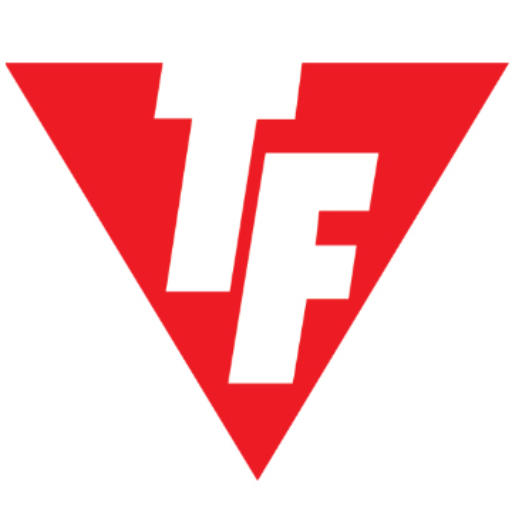Although you may not actually see them, forgings are present in just about anything that moves on land, in the air, or on the sea. In fact, many industries, including automotive, aerospace, agricultural, transportation, and defense rely on high-precision forgings. This article will explore the many ways forging companies positively impact industries, the economy, and even the environment.
Automotive & Transportation
 Forging has a major effect on the automotive and transportation industries.
Forging has a major effect on the automotive and transportation industries.
The car that you drive may contain over 200 forged components, including rocker arms, crankshafts, camshafts, pinions, torsion bars, and transmission gears.
Motor vehicles, trains, heavy-duty trucks, and other vehicles need durable components that have exceptional impact resistance and fatigue strength; these components must also be able to withstand harsh conditions.
Additionally, the mechanical properties of forged parts don’t only affect the performance of the component itself, but also the safety of the consumer who is operating the vehicle.
Aerospace
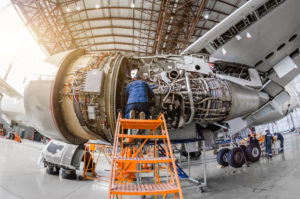
Aerospace is another industry that relies on lightweight but strong forged components. Most of the forged parts in an aircraft, including bulkheads, hinges, engine mounts, arresting hooks, and shafts are critical components. Aerospace components must have high strength-to-weight ratios and be able to handle heavy payloads.
Just like the automotive industry, if components are poorly manufactured, it’s not just a performance issue, but also a safety risk. Because safety is always a concern for aerospace manufacturers, there are strict requirements and standards related to the types of materials that are used to make components, how to test components, and more.
Forging manufacturers are able to conform to these safety standards and requirements by creating forged components with exceptional mechanical properties. The University of Toledo’s Mechanical, Industrial, and Manufacturing Engineering department actually found in their research that forged components have 26% higher tensile strength and 37% higher fatigue strength than cast components.
Agricultural
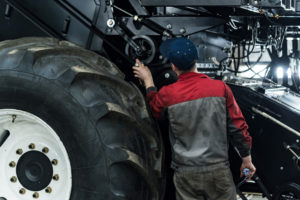
Automotive and aerospace manufacturers aren’t the only ones who rely on forged components. Most of the heavy-duty equipment that is used in the agricultural industry (ATVs, plows, fertilizer spreaders, combines, harvesters, etc.) contain multiple forgings. Without machinery, agricultural companies would see lower land output rates and an overall decrease in production capacity. In other words, there would be fewer crop cycles and less produce available for families and individuals in America.
The agricultural industry needs forging companies to create strong components that are able to withstand harsh operating conditions. And, as previously mentioned, the forging process is able to deliver components with higher fatigue and tensile strength compared to other manufacturing processes like casting.
Military/Defense
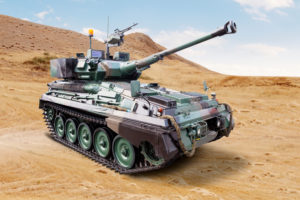
Forging companies help protect Americans and give strength to those fighting for our country. Nearly all types of military equipment, from aircrafts to HEMTTs to tanks to firearm components, contain forged parts. To add to this point, a tank contains more than 550 separate forgings. Just like the above-mentioned industries, military and defense also requires components with high strength-to-weight ratios, high tensile strength, and high fatigue strength.
Environment
Beyond creating forged components for the automotive, aerospace, agricultural, and defense industries, forging companies are also concerned about their impact on the environment. Many companies, like Trenton Forging, use innovative equipment and processes to reduce waste. Other environmentally friendly practices include recycling scrap from forgings to produce more raw steel which is then used to produce more forgings.
Also, some forging companies may offer rapid prototyping as a service. This allows manufacturers to identify design errors before they go through production, which reduces waste. Engineers at Trenton Forging can even create as-forged 3D CAD models based on customer drawings to help reduce waste and better control costs.
Benefits of Forging
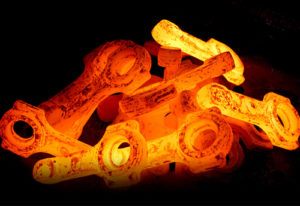
As we’ve mentioned previously, forging manufacturers have the unique ability to produce strong and durable components that many industries need.
They are able to do this because all forging processes focus on controlled deformation. Deformation refers to the process of changing, shaping, or “deforming,” a preheated billet into a forged component. In forging, deformation is “controlled” by the use of mechanical presses, drop hammers, and other equipment, offering the following benefits:
- Material uniformity: Controlled deformation prevents internal voids and ensures optimal grain flow. This results in the mechanical properties that many components need to have, including high tensile and fatigue strength.
- Exceptional value: OEMs and other manufacturers in specific industry sectors get the most value for their money because of the low life cycle costs of forging. No matter how demanding the application, or how complex the part is, components can be custom-forged based on specifications provided by the customer.
- Improved quality and lead times: It’s no secret that all industries rely on consistent quality and fast lead times. Forging companies are able to offer consistent quality by implementing controlled processes, industrial robots, and other automated technology into their existing processes. These approaches help to ensure better accuracy and more consistent quality, especially for high-volume productions.
Trenton Forging uses a fully-automated 2500T forging line. To stay on the cutting edge, we will introduce more automated press forging lines over the course of the next four years. Additionally, as a regional supplier, we help shorten supply chain lead times by performing all processes in the United States (most of them regionally).
An American Forging Company You Can Count On
Founded in 1967, Trenton Forging is proud to be a leader in the U.S. forging industry. We specialize in producing both symmetrical and asymmetrical custom forgings for clients in a wide array of industries, including automotive, agricultural, and defense. In addition to producing custom forgings, we also provide reverse engineering services, rapid prototyping, and custom tooling.
Contact us today to learn more about how we can help you.
